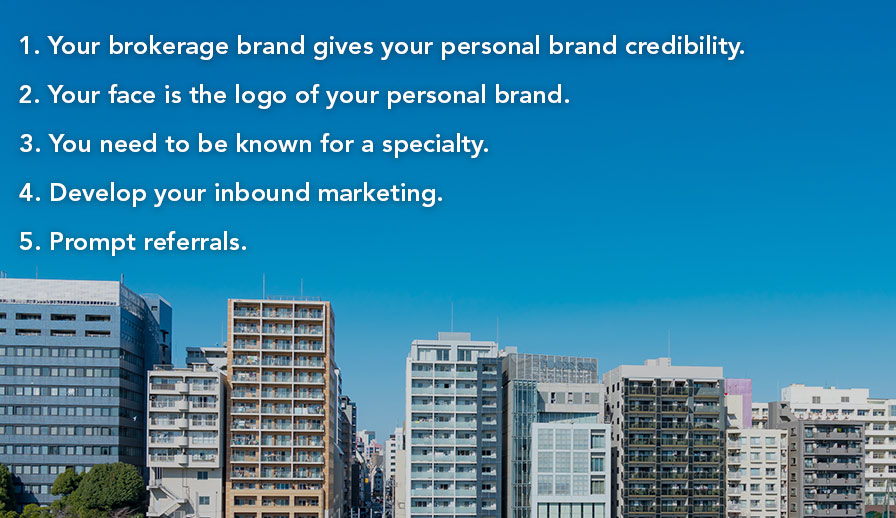Branding in real estate is a challenging mix of personal and large corporate brands. It can be challenging to know your place in the industry and how to best leverage all your brand assets to acquire new clients.
When I talk about building your brand, I’m talking about:
- brand awareness (how many people know of your brand); and
- brand depth (how willing those people are to engage you as an agent).
In another era, people would say a real estate agent or salesperson’s success is based on his or her reputation. That is as true as ever, but previously agents only had to worry about their relationships and Rolodex.
Now it’s more complicated. We refer to one’s reputation as their “brand.” A real estate agent’s success is based on his or her brand. Now that there are so many media and advertising channels available to real estate agents, it’s more helpful to think of your reputation as a “personal brand.” Using the word “brand” changes our mindset from something passively developed to something actively managed.
But don’t worry, you don’t need to become an expert in branding. You can engage experts as needed or brush up on only what you need to know.
Below are the five things you need to know when building a brand in real estate:

Note: All of this presumes you’re a great agent providing professional service; you cannot build a brand on an inferior product. But I’m an expert in branding, not real estate transactions, so I will leave it up to you to diligently do the work and learning required.
1) You are the brand. Your brokerage gives you credibility

Many real estate professionals believe the big brands in Canadian real estate are what draws people into the office. This belief is false.
A big brokerage merely reassures potential clients you’re credible. These companies’ logos are mental shortcuts in people’s minds to “safe and trusted in real estate.”
If you’re independent or building your own organization, you need to build credibility in other ways: endorsements, testimonials, a fantastic logo, etc.
2) Your face is your logo

What’s the purpose of a logo? A logo is a mental shortcut between a visual and all the opinions, associations, feelings, and memories a person has with a brand.
Organizations use a symbol because it’s the best thing they have available to them. No person can represent the organization over the decades, but a logo can remain constant through leadership and personnel changes.
It’s mind-boggling that we respond to symbols so well because they’re so abstract. But our ability to engage with symbols pales in comparison with our brain’s ability to recognize, remember, and associate feelings with faces.
“Research shows that many people recognize faces even if they forget other key details about a person, like their name or their job,” writes Ben Panko in his Smithsonian Mag article.
Our brain’s ability to visually process faces is unprecedented. We can recognize a face from far away, and when it’s a tiny patch on our visual field. Graphic designers wish this were the case for symbols; many company logos are hard to recognize when they’re too small or far away.
So, a photograph of your face is better at doing everything we wish a logo could do for a brand.
Use photos of yourself whenever possible and use your personal logo only when it’s impossible to use an image (like a piece with two-colour print or a sponsorship banner).
Putting your face out there may be challenging for some of you, but it’s vital to your success.
People are hiring you for your expertise, perspective, and people skills—not your looks. While you should do everything you can to present yourself well in your promotional photographs (professional clothes, make-up, and lighting), you don’t need to be a model. Potential clients just want to see who they will be working with.
3) There are riches in niches

Real estate agents don’t want to present themselves with a narrow focus because they don’t want to give potential clients a reason not to call them.
“I would call, but it says he’s the king of Main Street retail, and my property is a warehouse.”
But the reverse is true; people need a reason to call. Effective marketing motivates people to act; marketing does not try to eliminate every reason they might not do something.
The behavioral science is clear; we decide through our emotions, and then we need one logical reason to push us to action.
Your niche expertise may be the logical reason someone needs to reach out, even if your niche is tangentially related to their property of circumstance.
4) Focus on people who already value your services

There are people who you just aren’t going to convince.
You’ve got them on the line, and that guy on the seminar said, “push through the no,” and you spend forty minutes and all your energy for the day on a call with a person who will never engage you. Meanwhile, your inbox, text messaging apps, and voicemail are full of messages from people already working with you.
I recommend doing things in service of staying top of mind: email newsletters, mailers, annual reach outs, etc. But these activities should be 90% automated and take very little of your time and energy.
What I am warning you of in this section is spending time and/or energy convincing people who are unconvinced or not in the market.
Remember, a client’s decision to choose an agent is unconsciously made on an emotional level first and then backed up with logical reasons.
By trying to convince someone who has emotionally decided not to go with you, all you’re doing is pestering them, which entrenches their emotional decision. You will not be able to convince them with logic because they haven’t crossed the emotional hurdle yet.
So, how do you cross the emotional hurdle? One way is with design and branding. But it’s also being kind, courteous, and answering their questions. The relationship-building speaks to their emotional side, and they may come around. They may not; it’s mostly out of your control.
The trick to signing clients is selling to the people who have emotionally bought in. This is called inbound marketing. Inbound marketing is setting the environment up to encourage potential customers to take the first step to engage the brand. Executing an inbound marketing strategy provides pre-qualified leads for salespeople.
Inbound marketing for real estate agents means appropriately setting up a website, Google My Business profile, social media, and light paid promotion. All of these have a primary call to action (book a meeting) and a secondary call to action requiring slightly less emotional commitment ( for example: attend a seminar, sign up for a mailing list, free web-based appraisal).
5) Referrals don’t happen from excellent service alone

Brand awareness is how many people are aware of a brand and know what they’re about. Real estate agents build this over years of practicing in a locale and with promotion.
On the other hand, brand depth is how willing the people who know about a brand are to engage it. A strong brand like Apple does not need to convince people to buy their products or follow them on social media. People are suspicious of poorly managed brands and need extra convincing to engage over other brands.
Referrals are the best indicator of brand depth for real estate agents.
A customer who will refer you will also engage you when they’re back in the market. They value your work so much they will stake their reputation on that you will surely help their friend or family member.
A real estate agent earns this by providing quality service. They set reasonable expectations, meet or exceed them, and have a process and demeanor that makes clients feel comfortable throughout.
But referrals don’t happen with excellent service alone. Some people love your service, but it wouldn’t occur to them to refer a client to you.
A subtle but visible prompt will spark the idea to refer you.
These prompts could be:
- a line in your email signature;
- a note on your Christmas mailer;
- a fridge magnet in homes that closed; or
- a plaque on your lobby.
The other part of encouraging referrals is to reward people who refer you. If someone has referred you once, then they’ve demonstrated the willingness and the network connections required to refer you, and they’re more likely than the average person to do it again.
The thank-you gift can be a gift card to Starbucks, sending flowers, or even just a friendly phone call are all nice rewards for a referral.
The trick to encouraging future referrals is to ask: “Did someone refer you?” and if yes, then “Who referred you?”
If you don’t know someone is referring you, then you cannot encourage them to keep referring you.
You can also keep track (if only mentally) of what percentage of your clients come from referrals. If this number is rising, then your brand depth is improving. You’re on your way to a healthy brand.
TIP: Want to hear more about brand storytelling? Listen to Episode 1 of the REAL TIME podcast featuring Terry O’Reilly discussing the connection between REALTORS® and the emotional aspects of home buying and how to use those key elements to add value to your clients’ relationships and the sales process.





Very good article great information#
Is it better to brand my name as a real estate agent or create a different company name to brand and raise an organization?
The short answer is: your name, as you go by professionally. For example: “Tom Ortiz.”
If people commonly shorten your name (for example, Thomas = Tom), then you should use the shortened version in your marketing. If someone in the industry and region go by the same name, then you may want to add a middle initial (Tom E. Ortiz, for example) or make the active decision to go by a different name professionally (similar to a pen name for authors) to avoid confusion.
I presume you are starting out and working with an established brokerage firm. In that case, then a personal brand name works with the brokerage brand in a way that makes sense to regular people: “Tom Ortiz with *brokerage firm*.” Later in your career, you may want to partner with other agents and open your own office, or even your own brokerage. That makes branding decisions a little more complicated. But when you get there, you won’t regret the investment you have made in your personal brand.